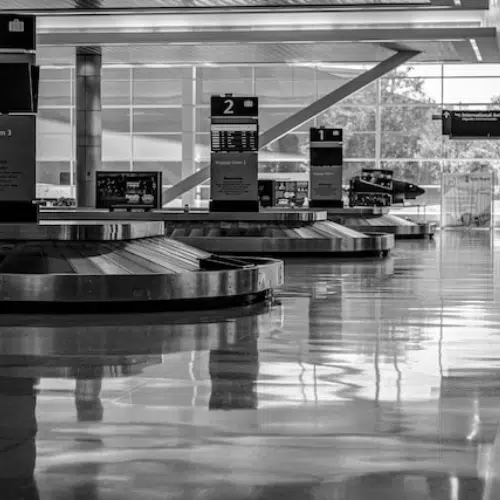6 Ways to Reduce the Chance of Air Travel Issues
This post may contain affiliate links, which means I’ll receive a commission if you purchase through my link, at no extra cost to you.
As fun as vacations are, flying there and back can be stressful on both your mind and body. Changing time zones and being out of your routine are inherently difficult, but the added uncertainty that comes with travel issues can be enough for some to swear off flying all together. While I can’t guarantee your next trip will go off without a hitch, here are a few strategies to reduce the risks.
1. Fly direct
Every flight you take is another chance for delays or cancellations. If you have a layover and your first flight is delayed, you risk missing you second flight and not making it to your destination as planned. You never know when a bird will hit your plane’s engine and cause hours and hours of delays (speaking from experience!).
I totally understand that this is not always possible depending on where you live and where you’re trying to go. However, when there’s an option, I prefer to pay a little extra for a direct flight and minimize my chance of a travel nightmare.
If flying direct isn’t possible, be conscious of how long your layover is. Although you understandably want to get to your destination as fast as possible, anything under an hour is cutting it too close for comfort. If flying internationally, you may need to get your bags and go through customs before getting on your next flight, which can slow you down and cause issues if you don’t have a long enough layover.
2. Choose your airline carefully
When weather is the issue, all airlines are impacted same. However generally speaking, some airlines have a better reputation of getting you to your destination on time than others. I personally prefer to fly Southwest domestically and have seen firsthand how they try to fly faster if they are running behind. Also, because Southwest only flies one type of plane, all their pilots can fly all their planes, which is important if staffing issues are the source of the problem.
Being loyal to an airline can also pay off if a wrench is thrown in your travel plans. If you have priority status, you may be able to get help sooner and may even have more options for getting home.
Additionally, check to see how many flights your airlines between your cities each day. The more flights they offer, the more options you have for getting home.
3. Take the earliest flight of the day
Every delay a plane faces carries through the rest of its schedule for the day. You never know where your plane is coming from before you board and what weather or mechanical issues it may have faced, slowing it down.
Waking up at super early to catch the first flight of the day certainly isn’t the easiest way to travel, but if your #1 goal is to make it to your destination on time, it can be worth the peace of mind. And you can always buy a coffee at the airport!
4. Get in line at the first sign of trouble
As soon as you realize your flight might be cancelled or delayed so long that you’ll miss your connection, get to the gate counter ASAP. It’s likely that many other people on your plane will be impacted the same way by the issue and everyone will be trying to rebook. If you’re one of the first people, you’ll have the best chance at getting a seat on the next flight.
Additionally, airline ticket agents are given only a handful of hotel or vouchers to give out if you have to stay overnight, so talking to them early can save you some money on a hotel or keep you from having to spend the night on the airport floor.
If you are stuck in the back of the line, use the time to call the airline help number and see if they can help you before it’s your turn in line. This is where having airline status can be extremely valuable!
5. Don’t check bags
I’ll admit that I’ve spent years as a chronic over packer (I’m working on this!) but I rarely check bags unless I’m bringing my skis or snowboard. We usually fly Southwest where we get 2 checked bags free per person, so it’s not about saving money. Being separated from your luggage risks never seeing it again. There have been countless articles lately about luggage issues at airports worldwide recently, so avoid risking this if at all possible.
Instead of just throwing everything I own into a suitcase 10 minutes before I leave for the airport, I take the time to think through what I really need for the trip and what clothes can be re-worn.
If you do have to check a bag, here are my recommendations:
- Keep the printout the airline gives you when they tag your checked bag. This information can often help the airline quickly locate your bag.
- Put an Apple AirTag inside so you can see where it is if it gets lost.
- Don’t pack anything important in your check bag (ex. laptop, medication, travel documents, etc.) as you may need these things if your bag goes missing.
- If you bag is lost, check and see if your airline and/or credit card company will reimburse you for any purchases you have to make to replace your missing items.
6. Bring anything you may need the day after you return home
We always travel with our work laptops, extra medication, and a spare change of underwear in case we aren’t able to get home the day we planned. When flying back from Seattle last year, we got stuck in Denver for the night and ended up working remotely from the hotel (that the airline gave us a voucher for!) all day before flying home that night.
Having anything you can’t live without for a day is really important because as much as you can try to minimize risks, you can never fully eliminate them.
You may also like:

